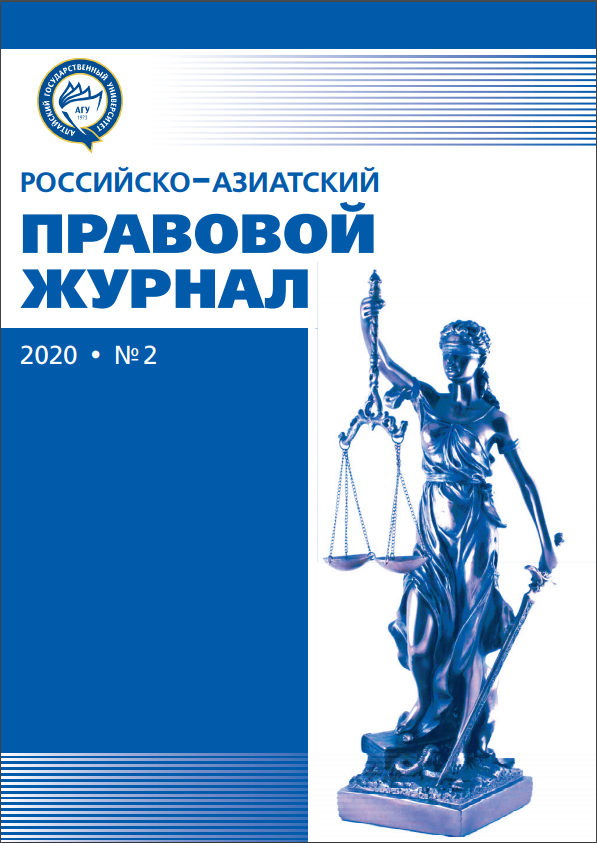ARTIFICIAL INTELLIGENCE AND LAW: PROBLEMS AND PROSPECTS
УДК 34.096 ББК 67.0
Abstract
In the modern scientific space, artificial intelligence researches are becoming popular and, as theresult, disputes about the prospects and risks of its wider use are growing. The rapid development ofdigital technologies causes the urgent need of expansion the boundaries in the sphere of legal regulationand emergence new segments in it. Today, the development of digital technologies demonstrates the longterm tendency to reduce the protective abilities of existing legal institutions, which aggravates the conflictbetween the advantages of modern technologies and current legislation. In this regard, it seems relevant to study the concept of artificial intelligence, its appearance as an independent scientific field, as well as thelegal risks of using artificial intelligence and ways to overcome them.The social and practical significance of the study lies in the search for optimal legal regulation, which,in turn, will facilitate the unhindered introduction of the latest technologies, which are the catalyst foreconomic growth and contribute to the development of the digital economy.Keywords: digital technologies, digital law, artificial intelligence, legal risks, digital economy
Downloads
References
2. Ларина Е.С., Овчинский В.С. Искусственный интеллект. Большие данные. Преступность. М.,2018.
3. Масленникова О. Е., Попова И.В. Основы искусственного интеллекта: учеб. пособие. URL: https://elibrary.ru/item.asp?id=19598580 (дата обращения: 06.05.2020).
4. О развитии искусственного интеллекта в Российской Федерации: указ Президента Российской Федерации от 10.10.2019 №490. URL: http://www.kremlin.ru/acts/bank/44731/page/1 (дата обращения: 06.05.2020).
5. Войниканис Е.А., Семенова Е.В., Тюляев Г.С. Искусственный интеллект и право: вызовы и возможности самообучающихся алгоритмов // Гражданское право. Гражданский процесс. 2018. №4.
6. Поляков М.П., Смолин А.Ю. Цифровые технологии на службе правосудия: идеологические предпосылки и технические перспективы // Юридическая наука и практика: Вестник Нижегородской академии МВД России. 2018. №2 (42).
7. Соснин К.А. Правовое регулирование Больших данных: зарубежный и отечественный опыт // Журнал Суда по интеллектуальным правам. 2019.
8. Мосечкин И.Н. Искусственный интеллект и уголовная ответственность: проблемы становления нового вида субъекта преступления // Вестник СПбГУ. Право. 2019. Т. 10. Вып. 3.
9. Решение № 2–160 / 2017 2–160 / 2017 ~ M-129/2017 M-129/2017 от 26.04.2017 по делу №2–160 / 2017. URL: https://sudact.ru/regular/doc/qlE6zawJCy6l/ (дата обращения: 06.05.2020).
10. Маклюен М. Понимание медиа: внешнее расширение человека. М., 2003.
11. Joshua A. T., The Human Element: The Under-Thorized and Underutilized Component Vital to Fostering Blockchain Development, (2019). URL: htts://scholarlycommons.law.wlu.edu/wlufac/537 (дата обращения: 06.05.2020).
Russian-Asian Law Journal is a golden publisher, as we allow self-archiving, but most importantly we are fully transparent about your rights.
Authors may present and discuss their findings ahead of publication: at scientific conferences, on preprint servers, in public databases, and in blogs, wikis, tweets, and other informal communication channels.
Russian-Asian Law Journal allows authors to deposit manuscripts (currently under review or those for intended submission) in non-commercial, pre-print servers such as ArXiv.
Authors who publish with this journal agree to the following terms:
- Authors retain copyright and grant the journal right of first publication with the work simultaneously licensed under a Creative Commons Attribution License that allows others to share the work with an acknowledgement of the work's authorship and initial publication in this journal.
- Authors are able to enter into separate, additional contractual arrangements for the non-exclusive distribution of the journal's published version of the work (e.g., post it to an institutional repository or publish it in a book), with an acknowledgement of its initial publication in this journal.
- Authors are permitted and encouraged to post their work online (e.g., in institutional repositories or on their website) prior to and during the submission process, as it can lead to productive exchanges, as well as earlier and greater citation of published work (See The Effect of Open Access).








